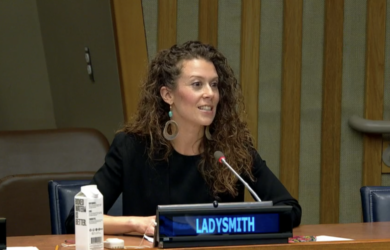
Todd Tucker's new book, Judge Knot, is an accessible exploration of the complex issue of investor-state dispute settlement.
A new book by Gates Cambridge Scholar Todd Tucker describes the complex world of investor-state dispute settlement [ISDS] in an accessible way and looks at how global trade and investment can be democratised.
Judge Knot, just published by Anthem Press, is the culmination of over five years of research and writing about one of the most successful (and controversial) aspects of globalisation.
ISDS is a legal system that has been included in investment treaties and trade agreements over several decades. Under these rules, foreign investors can legally challenge host state regulations outside that country’s courts. A wide range of policies can be challenged from anti-smoking efforts to environmental preservation laws. Tucker says: "The system is unusual in international law. Most international courts only allow disputes between states. ISDS, in contrast, creates one-way rights: Corporations can sue governments, but not vice versa."
Since 1990, investors have launched hundreds of claims against government regulation. Tucker's book explains what makes the system tick: its poorly understood centuries-old origins, why corporations demand investment law solutions to political problems, how arbitrators supply these solutions and why the system lasts despite the many politicians and citizens unhappy with it. It builds on interviews with the arbitrators who actually decide the cases and offers what Tucker says is "a concrete alternative to ISDS that leverages what works about the system and discards what does not, so that international law can be more supportive of democracy and development goals".
Tucker [2012] describes it as an extension of his PhD dissertation in Development Studies and says it is aimed at political scientists, development economists and international lawyers as well as a more popular audience.
Reviews of the book have been very position. Time Magazine's Haley Edwards says it "may very well be the first book on international investment law that you can, in good faith, recommend to a friend." International lawyer Anne-Marie Slaughter noted that the book "rejects facile critiques of these processes from the right and the left, offering instead a thoughtful and imaginative set of prescriptions for democratising global trade and investment". Ha-Joon Chang, who supervised Tucker's PhD, stated: "If you want to understand the future of our economic world, you must read this book."
The book is formally launched on 10th May in New York. Todd Tucker is currently a Fellow at the Roosevelt Institute and has previously worked at Public Citizen and Centre for Economic Policy Research in DC.
*Picture credit: bachmont, Wikimedia Commons.

Todd Tucker
- Alumni
- United States
- 2012 PhD Development Studies
- Queens' College
After graduating from Cambridge’s Development Studies M.Phil. programme in 2002, I worked at Public Citizen and CEPR in DC. There, I worked to ensure that U.S. policies allow countries to grow adequately and sustainably. In the fall of 2012, I will begin writing my PhD dissertation on the implications of the investor-state dispute settlement system for development policy. Few social scientists have studies this mechanism – whereby corporations can sue governments over financial and environmental policies. Rightsizing these agreements – mostly written before recent natural and man-made disasters reminded us of the virtues of sensible public interest safeguards – will be one of the central tasks for international governance in the 21st century. I hope to help train the next generation of policymakers, business leaders and advocates on how to design democratically accountable and effective global solutions to our most pressing problems, from climate change to income inequality.












